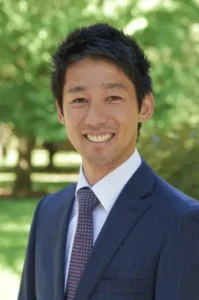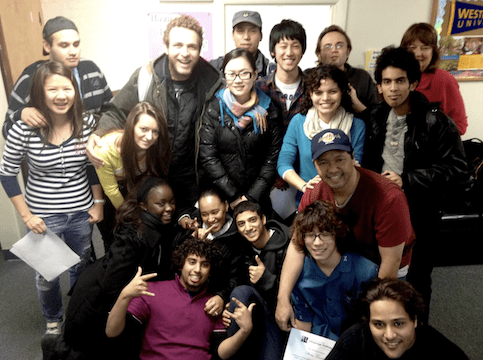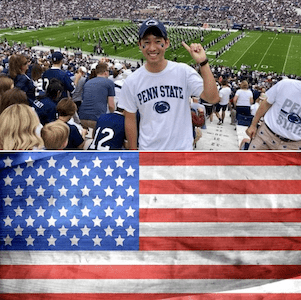A native of Japan, Takehiro Iwatsuki came to the Intensive English Program in 2011 at a beginning level. After six months of studying English for academic purposes at ILI, Hiro transitioned to Springfield College in Massachusetts, where he studied sports and exercise psychology, earned a graduate degree, and worked as the men and women’s tennis head coach. After that, Hiro earned a PhD in kinesiology with a minor in psychology at the University of Nevada, Las Vegas. Currently, he is a third-year assistant professor of Kinesiology at Penn State Altoona and looks forward to receiving his green card!
in 2011 at a beginning level. After six months of studying English for academic purposes at ILI, Hiro transitioned to Springfield College in Massachusetts, where he studied sports and exercise psychology, earned a graduate degree, and worked as the men and women’s tennis head coach. After that, Hiro earned a PhD in kinesiology with a minor in psychology at the University of Nevada, Las Vegas. Currently, he is a third-year assistant professor of Kinesiology at Penn State Altoona and looks forward to receiving his green card!
Our conversation touches on differences between Japanese and U.S. education, mental health during the pandemic, and his journey from beginning English classes at ILI to Springfield College, Penn State, and Google.
Could you tell us some more about your career in the US after studying academic English at ILI? What are you doing now at Penn State?
My job is kind of half and half. I teach three classes per semester. I’m teaching Introduction to Kinesiology, Sports and Exercise Psychology, and Motor Learning and Control. I do research and write research papers to publish them.
I also work as a teaching evaluator, so I go to other faculty members’ classes to evaluate their teaching and give feedback about whether they have a good interaction with students and provide good materials.
What are some ways you help international students learn academic English or study abroad in the US?
I have a YouTube channel. I’m in the unique position to talk about studying abroad from the beginning. I provide information I wish I had 10 years ago. Like, I wish I’d studied English a lot more before coming to the U.S. My information might be very helpful for Japanese students.
I talk about studying abroad in the US, what it’s like to live in the U.S. I give some tips about how to be a good student or how to write a research paper. I give strategies to get financial support, like a research assistant, teaching assistant, or a coach.
As someone who’s successfully transitioned from an Intensive English language program to university, do you have any advice for an international student coming to the US to learn academic English?
I would say, obviously do the assignments and pay attention to the class–your class, Janelle’s, Daniel’s class–and engage with the other classmates. 
After finishing school around 2:30 or 3:00 pm, you could do extra work, like more assignments. Or even just go to a coffee shop and listen to what Americans are talking about, that’s very important.
Other than that, use English as much as you can and try to give up your first language. I didn’t really speak Japanese while I was at ILI. I spoke with other Japanese students using English, and that was very good.
How did ILI’s help you transition to Springfield college? What was it like coming from Japan to Massachusetts to study English for academic purposes?
I didn’t have any good English skill or ability. I didn’t really have a good idea of academic writing. I learned paragraph writing when I was at ILI and I used it in college. ILI helped me to transition to Springfield College through the University Pathway Program.
At ILI I learned how to speak, how to interact, and how to behave in the classroom. That was very helpful for me to go to the next stage.
Do you feel like six months was the right amount of time to become fluent in English and attend university?
Honestly, I think it depends on how the individual feels. When I went to Springfield College, my English wasn’t really there. I wish I could have improved a little bit more, but within six months I did what I could do with my initial skills. Going to college is a big jump, and I think attending a formal language program and just understanding basic English is important.
Were there any surprises or academic culture shock coming to ILI and going to Springfield College, compared to school in Japan?
It’s a bit difficult to explain, but in Japan I don’t think we really have a good idea of paragraph writing. Paragraph writing is very important in the U.S.
If I’m going to describe the Japanese sort of regular education, the professor usually talks and you pay attention. There isn’t a lot of interaction between faculty members and students during the class.
But in U.S. education, you’re forced to discuss with other classmates. You’re trying to get your idea across or make a pitch, and you can just speak up. Especially in a small class or graduate course. Maybe not an undergraduate course like Introduction to Psychology with more than 100 students, that may not be the case. But smaller classes, like upper level courses, you need to speak with other students. That’s important.
Would you recommend studying English abroad and pursuing a career in the US as opposed to your native country?
At first I wasn’t quite sure I was going to study in the U.S. because there were a lot of unknowns and a lot of anxiety. Now, looking back, it’s probably the best decision that I made to go to the U.S.
Going to the U.S. to study changed my whole perspective. It opened a lot of opportunities, like getting paid to go to grad school and being head coach, and again, getting paid to go to a PhD program. Then I became a faculty member.
If I didn’t come to the U.S., everything I did in the past 10 years would be just nothing. That’s why I think I made a really good choice.
Another thing is I became a mental performance consultant at Google. Because my area is sports psychology, I became a performance consultant as an external contractor for a company I think we all know–Google, right?
When the pandemic happened, Google took their employees’ mental health very seriously. They decided to hire multiple sports psychologists from the US to provide tips or advice for employees. They wanted to expand that program internationally, and they were looking for somebody from an Asian country.
They identified faculty members or sports psychologists from Asia, and my name popped up. They checked my online presence and found my YouTube channel. They also found me as a faculty member at Penn State. I had an interview with the director of the Global Resilience Division at Google.
As a Google guru, what are your top tips for maintaining mental health during the pandemic?
Not checking the internet all the time, just disconnecting from the computer. We all use computers every single day and that’s sometimes really demotivating. Constantly checking your computer all day until you sleep, that’s not a good idea.
Exercising is good. And this is associated not only with the pandemic, but setting up goals is a good idea. Every morning you decide what you’re trying to accomplish. Once you’ve finished you can give yourself a treat.
When you want to connect with other peers, you can set up a zoom meeting where you eat dinner or lunch while calling.
And if you feel depressed, talk to counselors. Look for help. That’s perfectly normal. Sometimes people think it’s not okay to be not okay. You know, it’s okay to be not okay.
 Thanks to Hiro for catching up with ILI and sharing his insights into academics, culture, and mental health.
Thanks to Hiro for catching up with ILI and sharing his insights into academics, culture, and mental health.
Editors note: We just learned that Hiro just got his green card! Congratulations Hiro!
